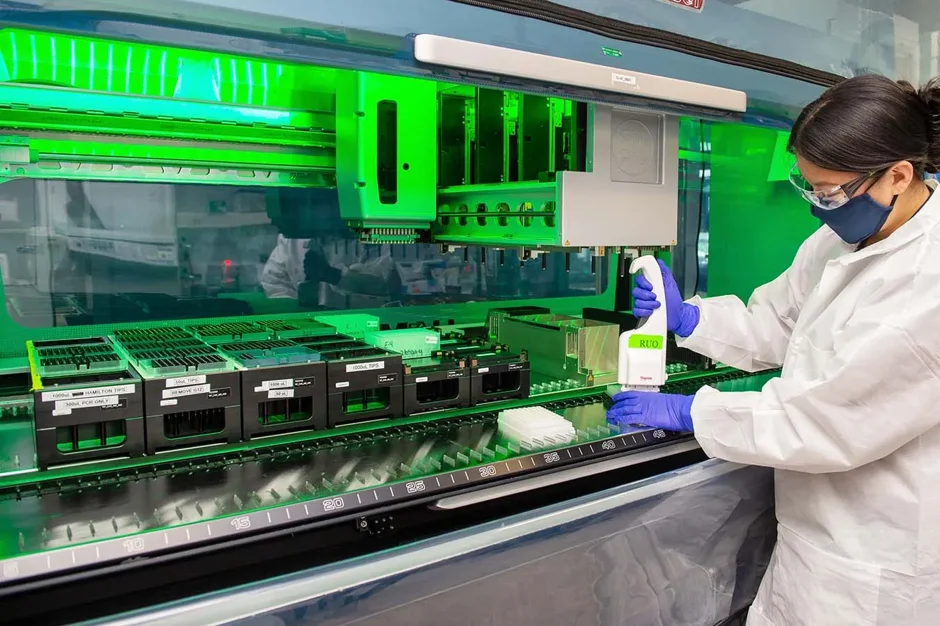Increasing the precision of brain cancer diagnoses and treatment
Featured Article | June 28, 2022
“Brain cancers and other CNS cancers are difficult to treat, and most adult patients know that the prognosis may not be good,” says oncologist Jens Rueter. “So when you’re talking with your patient about possible therapy approaches, the more information you have about the specific cancer, and the specific treatment options available to treat it, the better.”
Increasing the precision of tumor classification
Rueter is chief medical officer of The Jackson Laboratory (JAX) and medical director of the JAX-ledMaine Cancer Genomics Initiative (MCGI), a program to expand access to precision cancer care to patients throughout Maine.
Pathologists classify CNS tumors based on histological and genomic characteristics set out by the World Health Organization. The significant change and update of CNS tumor classification in the fifth edition of the WHO Classification of Tumors of the Central Nervous System, published in 2021, incorporates the new technique methylome profiling and extended genomic markers.
Methylome profiling—using microarrays to determine DNA methylation patterns across the genome in a tumor sample—holds promise to increase the precision of CNS tumor classification, and thus enable more accurate diagnoses and more targeted treatment approaches.
Stanley Chaleff is a pediatric oncologist at MaineHealth in Scarborough, Maine, and an MCGI participating clinician. Chaleff has recently been deploying methylome profiling on patient tumors that have been challenging to categorize. “For example, there are four subtypes of medulloblastoma, and the methylation array can help you to determine which one the tumor belongs to. I've also had some other patients whose tumors were just not well characterized through pure pathology, or even molecular approaches like next generation sequencing.”
The results of methylome profiling, Chaleff says, “help me narrow the diagnosis and help me with treatment decisions. We know that patients with certain tumor subtypes do better when they receive chemotherapy along with radiation. But I don't want to give that chemotherapy if I don't have to.” Chaleff predicts that, “over time, as we get more and more well-defined classifications from methylation, it'll be used more and more in the pediatric neuro-oncology world to help differentiate some tumors, especially the ones that may not have classic features.”
 More research work underway in the CLIA-certified Clinical Genomics laboratory at the JAX Genomic Medicine campus in Farmington, Connecticut.
More research work underway in the CLIA-certified Clinical Genomics laboratory at the JAX Genomic Medicine campus in Farmington, Connecticut.
Using a machine learning algorithm to better classify tumors
The JAX CLIA-certified Clinical Genomics laboratory, based at the JAX Genomic Medicine campus in Farmington, Conn., is now offering a methylome profiling assay, the OncoMethyl Array™, which utilizes a machine learning algorithm to classify CNS tumors based on genomic methylation profiling data. The foundation for the assay was a study led by researchers at the University Hospital Heidelberg in Germany,published in 2018 in the journal Nature, demonstrating a method for DNA methylation-based classification of CNS tumors.
To develop the new assay, the Clinical Genomics lab worked with JAX Professor Roel Verhaak, an expert in computational biology and brain cancers who hasconducted pioneering work in methylome profiling of CNS tumors, and was a peer reviewer of the 2018 Nature paper.
Verhaak comments, “Offering the OncoMethyl service will enable access to a highly precise identification of brain cancer subtype, which can make a major difference in treatment strategy. I am very excited that JAX has developed implemented this new assay, which is going to benefit a lot of patients.”
JAX Professor Ching Lau, a clinical oncologist who directs the pediatric hematology-oncology programs at Connecticut Children’s Medical Center and is an expert in pediatric cancer genomics research, has also been involved in the development of the new array. “JAX is in the forefront of cancer diagnostics by offering the DNA methylome profiling,” Lau comments. “As the platform gains more general acceptance in the neuro-oncology field, we expect this would become part of the gold standard in the diagnosis of brain tumors.”
The gold standard in the diagnosis of brain tumors
Davey says that pathologists who are already working with JAX can now order the test through their portal accounts; others can establish an account by reaching out to[email protected] to establish an account with clinical lab to begin ordering, or to learn more about the test methodology or ordering process. More information about the ordering assay is available on the Clinical Genomics website.
Qian Wu is professor of pathology and laboratory medicine at UConn Health in Farmington, Conn, who is specialized in neuron-oncology and muscles. “DNA methylation profiling provides a powerful tool in accurately diagnosing CNS tumors,” Wu says. “Diagnostic criteria for several WHO 2021 CNS tumor entities require methylation. UConn has been conducting clinical and academic collaborations with JAX in this exciting area. Some of our findings are leading to new understanding of CNS tumor biology.”
Davey says, “JAX established the Clinical Genomics laboratory in 2013 to translate future discoveries in genomic medicine into new diagnostic tests. The new OncoMethyl assay is another success in our goal to bring cutting-age technologies to support advanced cancer diagnoses and patient care."

